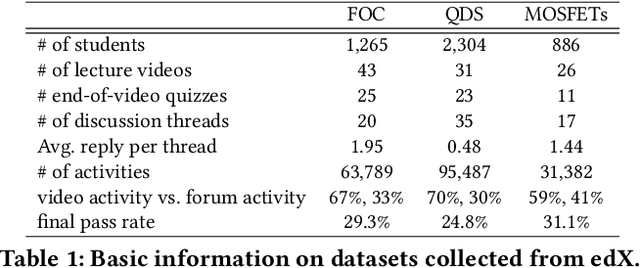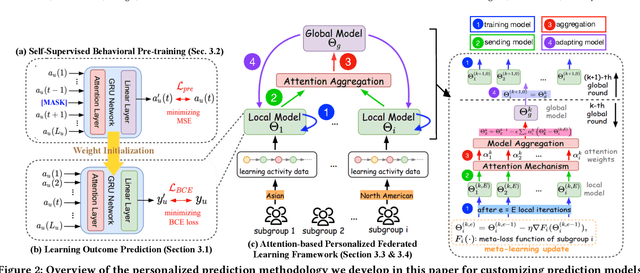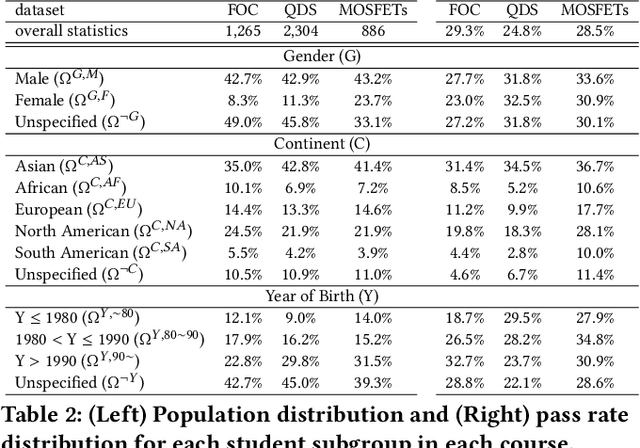Laura Cruz
Multi-Layer Personalized Federated Learning for Mitigating Biases in Student Predictive Analytics
Dec 05, 2022



Abstract:Traditional learning-based approaches to student modeling (e.g., predicting grades based on measured activities) generalize poorly to underrepresented/minority student groups due to biases in data availability. In this paper, we propose a Multi-Layer Personalized Federated Learning (MLPFL) methodology which optimizes inference accuracy over different layers of student grouping criteria, such as by course and by demographic subgroups within each course. In our approach, personalized models for individual student subgroups are derived from a global model, which is trained in a distributed fashion via meta-gradient updates that account for subgroup heterogeneity while preserving modeling commonalities that exist across the full dataset. To evaluate our methodology, we consider case studies of two popular downstream student modeling tasks, knowledge tracing and outcome prediction, which leverage multiple modalities of student behavior (e.g., visits to lecture videos and participation on forums) in model training. Experiments on three real-world datasets from online courses demonstrate that our approach obtains substantial improvements over existing student modeling baselines in terms of increasing the average and decreasing the variance of prediction quality across different student subgroups. Visual analysis of the resulting students' knowledge state embeddings confirm that our personalization methodology extracts activity patterns which cluster into different student subgroups, consistent with the performance enhancements we obtain over the baselines.
Mitigating Biases in Student Performance Prediction via Attention-Based Personalized Federated Learning
Aug 02, 2022



Abstract:Traditional learning-based approaches to student modeling generalize poorly to underrepresented student groups due to biases in data availability. In this paper, we propose a methodology for predicting student performance from their online learning activities that optimizes inference accuracy over different demographic groups such as race and gender. Building upon recent foundations in federated learning, in our approach, personalized models for individual student subgroups are derived from a global model aggregated across all student models via meta-gradient updates that account for subgroup heterogeneity. To learn better representations of student activity, we augment our approach with a self-supervised behavioral pretraining methodology that leverages multiple modalities of student behavior (e.g., visits to lecture videos and participation on forums), and include a neural network attention mechanism in the model aggregation stage. Through experiments on three real-world datasets from online courses, we demonstrate that our approach obtains substantial improvements over existing student modeling baselines in predicting student learning outcomes for all subgroups. Visual analysis of the resulting student embeddings confirm that our personalization methodology indeed identifies different activity patterns within different subgroups, consistent with its stronger inference ability compared with the baselines.
Click-Based Student Performance Prediction: A Clustering Guided Meta-Learning Approach
Nov 16, 2021



Abstract:We study the problem of predicting student knowledge acquisition in online courses from clickstream behavior. Motivated by the proliferation of eLearning lecture delivery, we specifically focus on student in-video activity in lectures videos, which consist of content and in-video quizzes. Our methodology for predicting in-video quiz performance is based on three key ideas we develop. First, we model students' clicking behavior via time-series learning architectures operating on raw event data, rather than defining hand-crafted features as in existing approaches that may lose important information embedded within the click sequences. Second, we develop a self-supervised clickstream pre-training to learn informative representations of clickstream events that can initialize the prediction model effectively. Third, we propose a clustering guided meta-learning-based training that optimizes the prediction model to exploit clusters of frequent patterns in student clickstream sequences. Through experiments on three real-world datasets, we demonstrate that our method obtains substantial improvements over two baseline models in predicting students' in-video quiz performance. Further, we validate the importance of the pre-training and meta-learning components of our framework through ablation studies. Finally, we show how our methodology reveals insights on video-watching behavior associated with knowledge acquisition for useful learning analytics.
 Add to Chrome
Add to Chrome Add to Firefox
Add to Firefox Add to Edge
Add to Edge